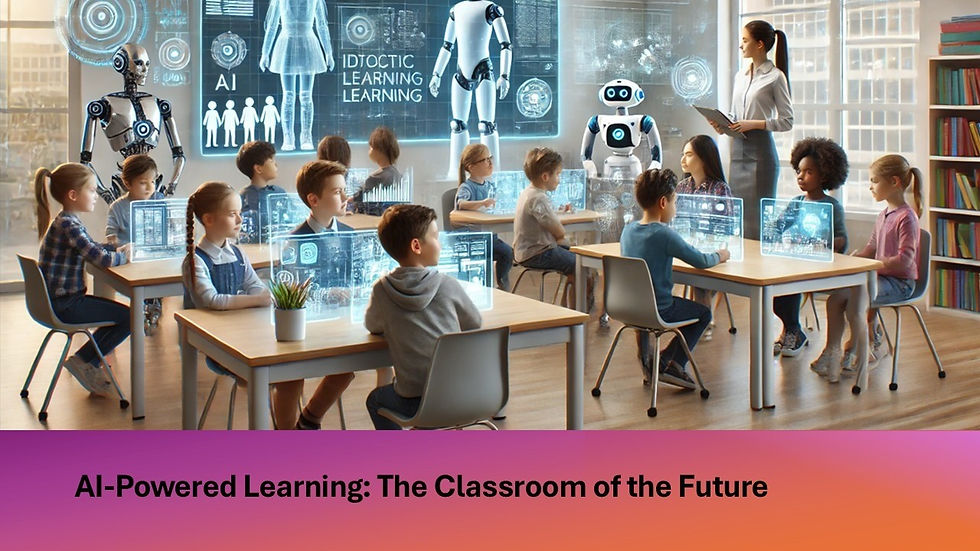AI in Education: The Future of Learning or a Risk to Schools?
- Britt Konnander
- Apr 21, 2025
- 4 min read

The Biggest Transformation in Decades – Are We Ready?
Artificial Intelligence (AI) is reshaping education. From personalized learning to automated grading and intelligent educational platforms, AI has the potential to enhance both teaching and administration.
But with these opportunities come challenges:
Will AI strengthen the role of teachers or replace them? Does it reinforce existing inequalities?
Is Sweden prepared to keep pace with global advancements in AI-powered education?
In this article, we explore AI's impact on education—its benefits, risks, and what is needed for Sweden to stay ahead.
The Explosive Growth of AI in Schools
The role of AI in education is expanding rapidly. The global AI market in education is expected to reach $32.27 billion by 2030, growing at an annual rate of over 31% (Reports Insights, 2024).
What’s Driving This Growth?
Increased demand for personalized learning
The need for more efficient school administration
Rapid digitalization, accelerated by the pandemic
While countries like the U.S. and China are leading AI integration in schools, Europe—particularly Sweden—has been much slower to adapt (Tech Informed, 2024).
Can Sweden afford to wait while others move ahead?
Opportunities with AI in Education
Teachers face an increasing challenge: providing individualized learning while resources remain constrained. For students with special needs, this often means they risk falling behind.
AI can help bridge this gap. By creating personalized learning pathways and providing real-time feedback, AI ensures that all students receive tailored support. Meanwhile, teachers benefit as AI automates tasks such as grading and lesson planning, allowing them to focus on student engagement and deeper learning experiences.
Studies show that AI-driven learning tools can improve student performance by up to 20%, with adaptive learning pathways increasing academic success by 30% (McKinsey, 2024).
Swedish AI Initiatives in Schools
Several Swedish municipalities are already leveraging AI-powered tools:
Helsingborg has implemented AI to assist students with reading and writing difficulties. AI-driven platforms provide personalized training, helping students enhance reading skills and language comprehension.
Lexplore, an AI-based tool, detects dyslexia through eye-tracking technology. This allows early identification of students who need additional support, enabling schools to intervene before learning challenges escalate.
These initiatives prove that AI is not just theoretical—it is already improving learning outcomes today.
AI’s Impact on Students, Teachers, and School Leaders
AI is transforming education at all levels, offering tangible benefits:
Students: AI-powered learning adapts to individual needs, enhancing academic performance and engagement.
Teachers: Automating grading and lesson planning can reduce workload by up to 40%, giving educators more time for personalized instruction (Harvard Business Review, 2024).
School Leaders: AI optimizes resource allocation, tracks student progress, and enhances decision-making for more efficient school management (OECD, 2024).
Society: AI fosters a more inclusive and equitable education system, supporting long-term innovation and economic growth (UNESCO, 2024).
But with opportunities come challenges—how do we ensure AI benefits everyone fairly?
Challenges of AI in Schools – What Are the Risks?
Despite its potential, AI presents challenges that must be addressed:
⚠️ Bias in AI Algorithms – AI can reinforce inequalities if trained on biased data, leading to unfair assessments.
⚠️ Transparency Issues – Many AI systems operate as "black boxes," making it unclear how decisions are made.
⚠️ Data Privacy & Security – AI requires large amounts of student data, raising concerns about GDPR compliance and data protection.
The Swedish National Agency for Education (Skolverket) stresses that responsible AI implementation requires teacher training and ethical guidelines (Skolverket, 2023).
Is AI a Smart Investment for Schools?
AI in education is not just a technological upgrade—it is a long-term investment that can improve school efficiency, student outcomes, and cost management.
OECD research confirms that AI-powered predictive analytics can optimize school operations, making education more cost-effective (OECD, 2024).
AI helps schools identify at-risk students early, preventing dropouts.
Automated administrative tasks free up teacher resources for quality instruction.
Data-driven decision-making improves educational planning and resource allocation.
The real question is not whether AI is worth the investment, but how we implement it responsibly.
How to Begin This Journey? (A Step-by-Step Guide for Schools)
For AI to be successfully integrated into schools, a clear and structured approach is essential. Schools and education authorities must:
✅ Develop a national AI strategy for education – Define goals, guidelines, and funding structures.
✅ Train teachers and school leaders in AI literacy – AI should empower educators, not replace them.
✅ Ensure ethical and transparent AI usage – AI must comply with GDPR and student privacy laws.
✅ Promote equal access to AI tools – Schools must have fair access to AI-driven learning technologies.
A structured AI strategy ensures education benefits all students—rather than creating new divides.
The Future Has Already Begun – What’s Next?
AI has the power to revolutionize education in Sweden in ways we previously only imagined. However, its full potential can only be realized through bold leadership and strategic investment.
Policymakers, school leaders, and educators—this is the moment to act! Sweden has the opportunity to lead AI-driven education and create a more efficient, inclusive, and future-ready school system.
Let’s not wait—let’s make it happen!
What Is Your School’s AI Strategy? (Join the Discussion!)
We want to hear from you!
💡 How is AI being used in your school today?
💡 What challenges do you see with AI in education?
💡 Is your school ready to take the next step toward AI-driven learning?
Join the conversation—comment and share your insights!
About Britt Konnander – AI & Digital Transformation Expert
Britt Konnander is the CEO of Breaking Boundaries Consulting, a firm specializing in digital transformation and AI-driven innovation. With extensive experience in change management and strategic advisory, she has helped public and private sector organizations implement AI responsibly and leverage technology for real value creation.
Comments